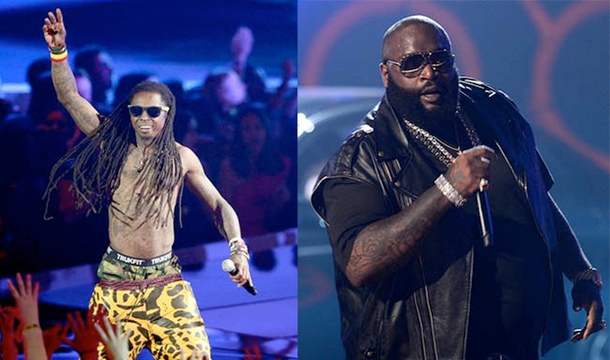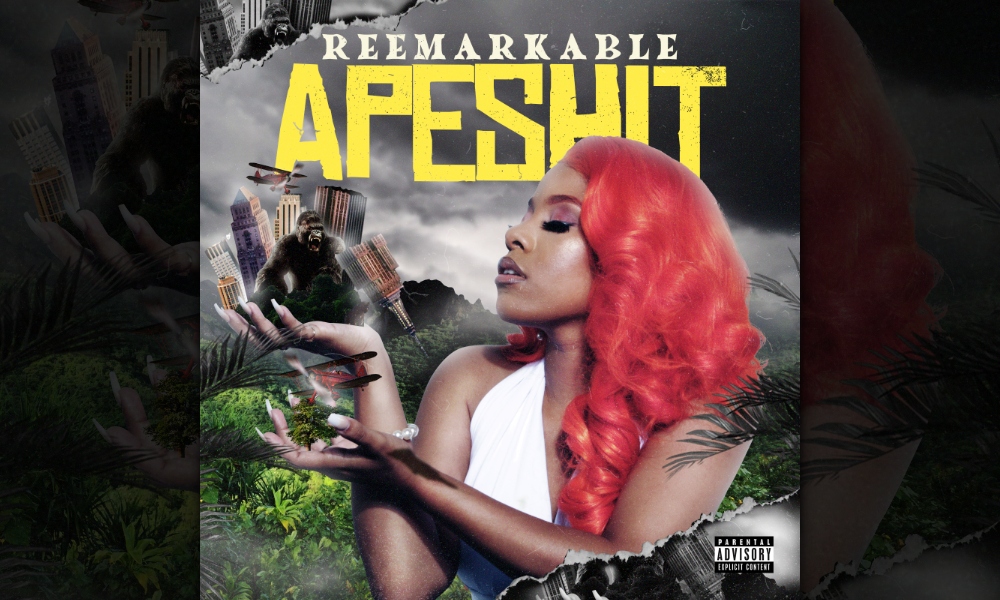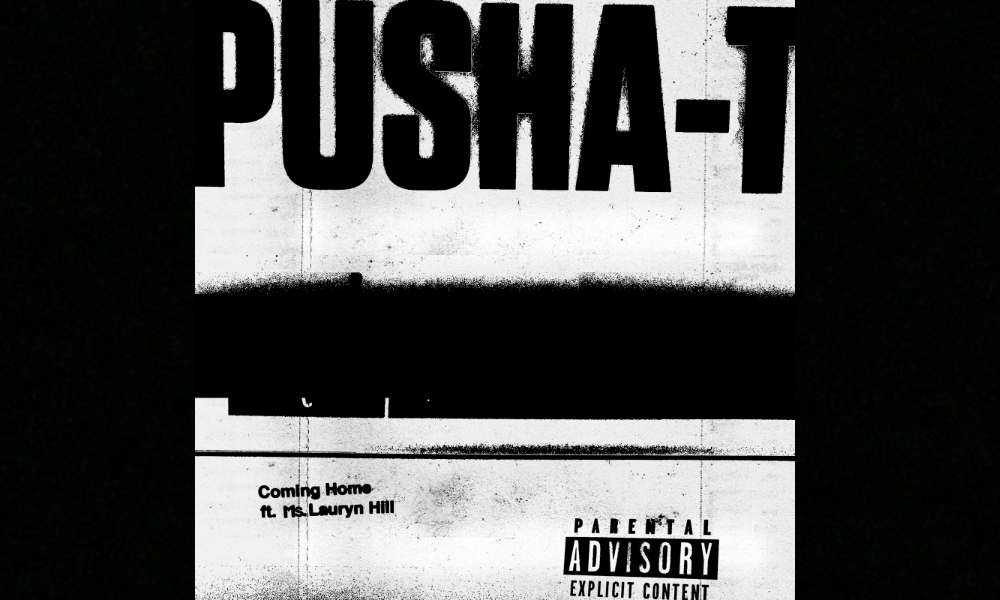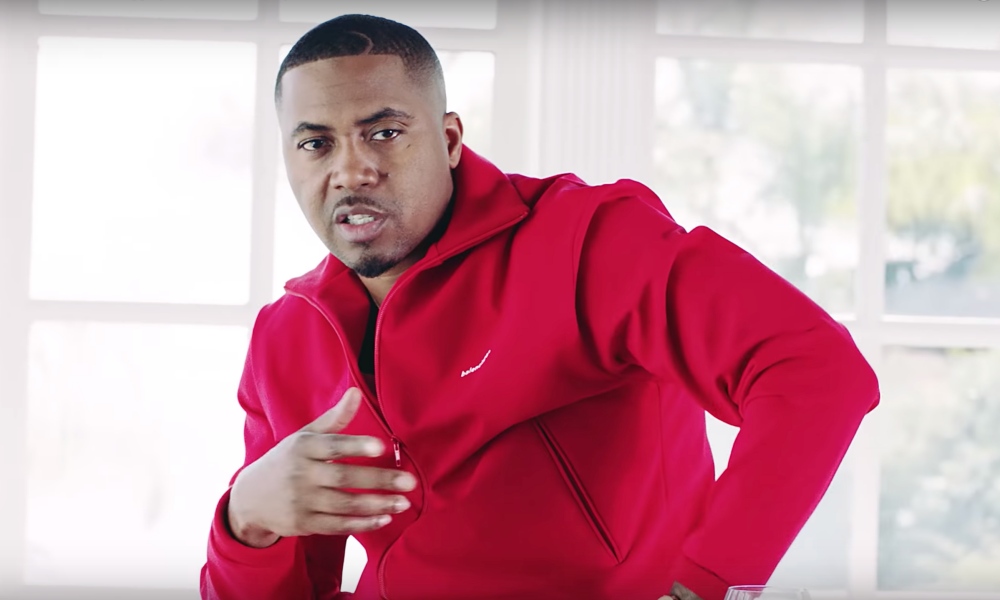After recent public backlash over the lyrics of Lil Wayne and Rick Ross that promote violence against women, a radio station in Michigan, WUVS-LP 103.7, has released an official statement that Lil Wayne and Rick Ross songs will no longer receive airplay on their station.
The statement mentions Wayne’s lyric on Future’s leak of “Karate Chop” where he compares a sex act to the brutal murder of Emmett Till, and Ross’ feature on Rocko’s song “You Don’t Even Know It” that speaks of date raping a woman.
The station's statement reads:
“The questions have been asked, Is Hip Hop Music Destroying America, Is Hip Hop A Threat To Our Children or Should Rappers Be Accountable For Their Lyrics? You be the judge. Earlier this year the song “Karate Chop” leaked online featuring rapper Lil Wayne. He raps, “Bout to put rims on my skateboard wheels/Beat that (expletive/woman genital) up like Emmett Till.” A few weeks later a song by rapper Rocko featuring Rick Ross was released called “You Don’t Even Know It.” Rick Ross raps, ‘Put molly all in her champagne, she ain’t even know it/ I took her home and I enjoyed that, she ain’t even know it.’ Yes, we have our freedom of speech right, but when is freedom of speech taken too far?”
“Many would say both rappers have taken their lyrical content too far and offended too many. The family and estate of Emmett Till have released a statement of disapproval over Lil Wayne’s disregard and disrespectful lyrics. Though his record label issued a statement of apology, the rapper has yet to do so. In the case of Rick Ross, a petition has been started over his blatant disregard for women and the issue of date rape. The U.S. Department of Justice estimates that over 300,000 women are raped or sexually assaulted per year in the United States alone. That is a disturbing number and should not be taken lightly. His lyrics not only condone the behavior, but he boasts about it in the song. While some feel it’s only entertainment, many feel it sends and encourages the wrong message. Several individuals and organizations have taken a stand and so are we. Effective immediately Muskegon’s WUVS-LP 103.7 the Beat has pulled ALL Lil Wayne and Rick Ross music from rotation. We pride ourselves on playing music that is non-degrading and non-violent. While we believe in freedom of speech, creative writing and individualism, we refuse to be part of the problem by spreading messages that could harm or end someone’s life.”
How do you feel about WUVS’s decision to boycott Wayne’s and Ross’s music? Was it a necessary move, or an infringement on free speech?
Michigan radio station, WJIM-FM, has recently come under fire for their decision to ban music from hip hop artists Lil Wayne and Rick Ross. The move has sparked outrage amongst fans of the two megastars, who believe it’s an unfair limitation on their right to free speech. But what could have caused a major radio station to take such drastic measures? This article takes a look at why WJIM-FM decided to stop playing music from these two rap icons – and explores the implications this has for listeners’ freedom in Michigan.
The banning of Lil Wayne and Rick Ross is just one example of how censorship can limit people’s access to popular culture. It also illustrates how easily our own rights as citizens can be taken away without much warning or discussion. With this action, WJIM-FM is sending a clear message that certain types of expression are not welcome on their airwaves – no matter how many fans may disagree with them.
For now, the future of these two rappers’ careers hangs in the balance while WJIM-FM stands by its controversial decision. Will other stations follow suit? Or will public outcry lead to a change in policy at the Michigan radio station? Read on to find out more about why WJIM-FM banned Lil Wayne and Rick Ross’s music – and where we go from here.
Background Of Controversy
The controversy surrounding the banning of Lil Wayne and Rick Ross music from Michigan radio stations has been ongoing for some time. In response to recent outcry from listeners, a number of stations have chosen to remove the artists’ songs from their airplay lists altogether. This decision is one that has sparked much debate among fans who believe such censorship should not be allowed in an open society.
At its core, this dispute centers around potential negative influences these rap stars may have on younger generations of Americans. The lyrics associated with both performers are often considered controversial or even offensive by certain groups due to their graphic descriptions of violence and other questionable behavior. As such, many people feel it’s important to keep children away from hearing them as they can lead to inappropriate behavior if not monitored properly.
As a result, station managers across the state have taken action in order to protect their audiences from potentially harmful material. By removing those certain tracks which contain explicit content, they hope to ensure positive messages are being sent through the airwaves instead. It remains to be seen what effect this will ultimately have on the community at large but it’s clear that public opinion will play a major role in determining how successful these efforts truly are.
Reaction To The Ban
The decision to ban Lil Wayne and Rick Ross music from Michigan radio stations has been met with a variety of reactions. Some listeners have applauded the efforts, believing that it will help protect young people from potential harm due to hearing explicit lyrics. Others feel this is taking censorship too far and infringes upon their right to free speech as outlined in the First Amendment.
This controversial topic has become so heated that many people are now calling for boycotts against certain radio stations if they continue to air the artists’ songs. Supporters argue that such actions are necessary in order to send a message about what kind of content should be allowed on public airwaves. On the other hand, opponents believe these tactics go against an individual’s freedom of choice when deciding which type of music they want to listen to.
Clearly, this debate continues to divide opinion within Michigan and beyond. With no clear consensus between those who support or oppose banning these rap stars’ music, it looks like it may take some time before any meaningful resolution can be reached by all sides involved. Ultimately, only time will tell how this situation plays out and whether further restrictions will follow suit elsewhere across America.
Conclusion
I. Summary of Ban
In Michigan, a radio station recently banned music from Lil Wayne and Rick Ross due to controversial lyrics in their songs. This was met with mixed reactions from fans and the public alike as some felt it was necessary to protect the public from offensive content while others argued that banning certain artists violated freedom of expression.
II. Impact on Music Industry
The ban has had an impact on both Lil Wayne and Rick Ross’s careers; as they have seen decreased airplay in this region which may affect record sales or touring opportunities there. It also raises questions about censorship within the music industry and how far stations should go when policing what is deemed appropriate for broadcast.
III. Personal Opinion
Personally, I feel that each artist has a right to express themselves through their artistry regardless of whether we agree with the message or not. The decision to censor specific artists can be harmful if taken too far because it limits our exposure to different perspectives and opinions, even those that are considered socially unacceptable or controversial at times. We must strive for more open dialogue rather than resorting to bans that may limit creative expression.








